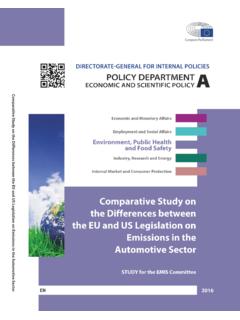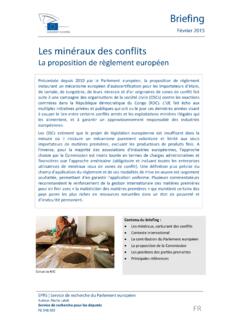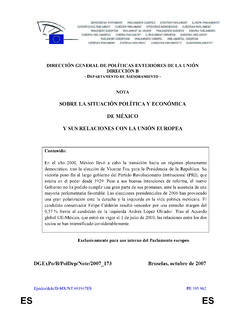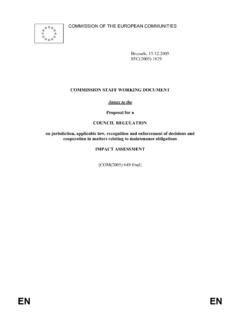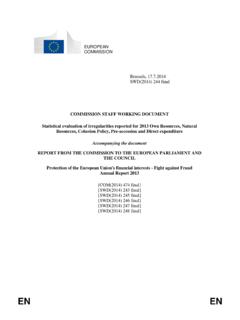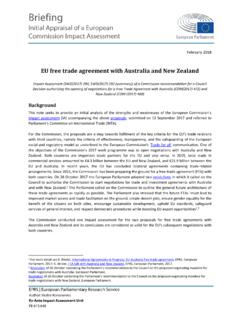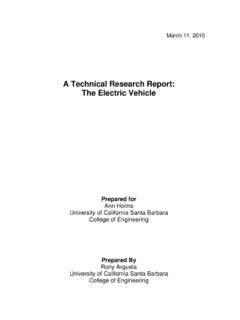Transcription of European Parliament
1 European Parliament2019-2024 TEXTS ADOPTEDP9_TA(2022)0077 batteries and waste batteries **IAmendments adopted by the European Parliament on 10 March 2022 on the proposal for a regulation of the European Parliament and of the Council concerning batteries and waste batteries , repealing Directive 2006/66/EC and amending Regulation (EU) 2019/1020 (COM(2020)0798 C9-0400/2020 2020/0353(COD))1(Ordinary legislative procedure: first reading)Amendment 1 Proposal for a regulationRecital 2 Text proposed by the CommissionAmendment(2) batteries are thus an important source of energy and one of the key enablers for sustainable development, green mobility, clean energy and climate neutrality.
2 It is expected that the demand for batteries will grow rapidly in the coming years, notably for electric road transport vehicles using batteries for traction, making this market an increasingly strategic one at the global level. Significant scientific and technical progress in the field of battery technology will continue. In view of the strategic importance of batteries , and to provide legal certainty to all operators involved and to avoid discrimination, barriers to trade and distortions on the market for batteries , it is necessary to set out rules on sustainability parameters, performance, safety, collection, recycling and second life of batteries as well as on information about (2) batteries are thus an important source of energy and one of the key enablers for sustainable development, green mobility, clean energy and climate neutrality.
3 It is expected that the demand for batteries will grow rapidly in the coming years, notably for electric road transport vehicles and light means of transport using batteries for traction, making this market an increasingly strategic one at the global level. Significant scientific and technical progress in the field of battery technology will continue. In view of the strategic importance of batteries , and to provide legal certainty to all operators involved and to avoid discrimination, barriers to trade and distortions on the market for batteries , it is necessary to set out rules on sustainability parameters, performance, safety, collection, recycling and second life of 1 The matter was referred back for interinstitutional negotiations to the committee responsible, pursuant to Rule 59(4), fourth subparagraph (A9-0031/2022).
4 batteries . It is necessary to create a harmonised regulatory framework for dealing with the entire life cycle of batteries that are placed on the market in the as well as on information about batteries for consumers and economic operators. It is necessary to create a harmonised regulatory framework for dealing with the entire life cycle of batteries that are placed on the market in the Union .Amendment 2 Proposal for a regulationRecital 2 a (new)Text proposed by the CommissionAmendment(2a) It is also necessary to update Union legislation on the management of battery waste and to take measures to protect the environment and human health by preventing or reducing the adverse impacts of the generation and management of waste, by reducing the impact of resource use and by improving resource efficiency.
5 Such measures are crucial for the transition to a circular and climate-neutral economy and toxic-free environment, and for the Union s long-term competitiveness and strategic autonomy. They can create important economic opportunities, increasing synergies between the circular economy and energy, climate, transport, industry and research policies, and protecting the environment and reducing greenhouse gas 3 Proposal for a regulationRecital 10 Text proposed by the CommissionAmendment(10) This Regulation should apply to all types of batteries and accumulators placed on the market or put into service within the Union, whether on their own or incorporated into appliances or otherwise supplied with electrical and electronic appliances and vehicles.
6 This Regulation (10) This Regulation should apply to all types of batteries and accumulators placed on the market or put into service within the Union, regardless of whether they were produced in the Union or imported, whether on their own or incorporated into appliances or otherwise supplied with should apply regardless of whether a battery is specifically designed for a product or is of general use and regardless of whether it is incorporated into a product or is supplied together with or separately from a product in which it is to be and electronic appliances and vehicles. This Regulation should apply regardless of whether a battery is specifically designed for a product or is of general use and regardless of whether it is incorporated into a product or is supplied together with or separately from a product in which it is to be 4 Proposal for a regulationRecital 12 Text proposed by the CommissionAmendment(12) Within the Regulation s wide scope, it is appropriate to distinguish between different categories of batteries in accordance with their design and use, independent of the battery chemistry.
7 The classification into portable batteries , on one hand, and industrial batteries and automotive batteries on the other hand under Directive 2006/66/EC should be further developed to better reflect new developments in the use of batteries . batteries that are used for traction in electric vehicles and which under Directive 2006/66/EC fall in the category of industrial batteries , constitute a large and growing part of the market due to the quick growth of electric road transport vehicles. It is therefore appropriate to classify those batteries that are used for traction in road vehicles as a new category of electric vehicle batteries .
8 batteries used for traction in other transport vehicles including rail, waterborne and aviation transport, continue to fall under the category of industrial batteries under this Regulation. The industrial battery type encompasses a broad group of batteries , intended to be used for industrial activities, communication infrastructure, agricultural activities or generation and distribution of electric energy. In addition to this non exhaustive list of examples, any battery that is neither a portable battery nor an automotive battery nor an electric vehicle battery (12) Within the Regulation s wide scope, it is appropriate to distinguish between different categories of batteries in accordance with their design and use, independent of the battery chemistry.
9 The classification into portable batteries , on one hand, and industrial batteries and automotive batteries on the other hand under Directive 2006/66/EC should be further developed to better reflect new developments and market spread in the use of batteries . batteries that are used for traction in electric vehicles and which under Directive 2006/66/EC fall in the category of industrial batteries , constitute a large and growing part of the market due to the quick growth of electric road transport vehicles. It is therefore appropriate to classify those batteries that are used for traction in road vehicles as a new category of electric vehicle batteries .
10 batteries used for traction in other transport vehicles including rail, waterborne and aviation transport, continue to fall under the category of industrial batteries under this Regulation. batteries used for traction in light means of transport, such as e-bikes and e-scooters, were not clearly classified as batteries under Directive 2006/66/EC, and constitute a significant part of the market due to their growing use in urban sustainable mobility. It is therefore appropriate to classify those batteries that are used for traction in light means of should be considered an industrial battery. batteries used for energy storage in private or domestic environments.
